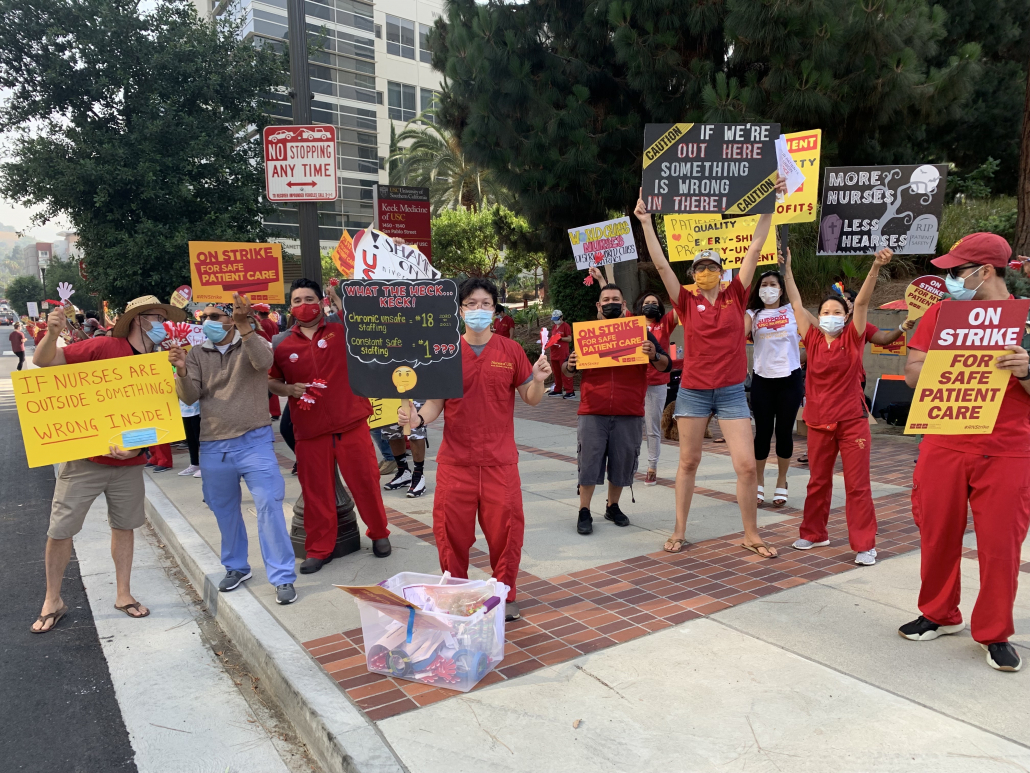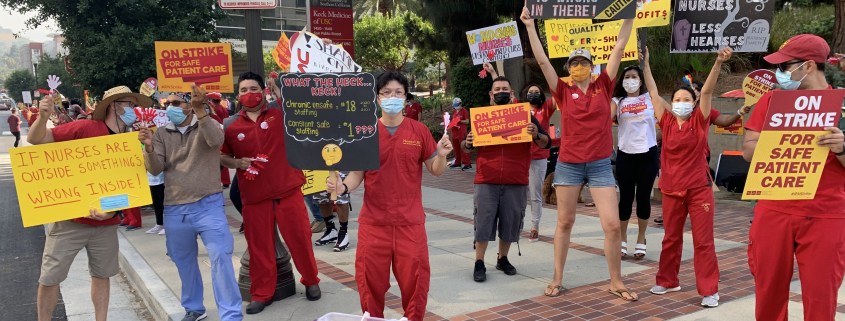USC Keck nurses strike amid understaffing and patient safety concerns

Inside Keck Medicine of USC, Kerri Dodgens, a nurse, was stuck. In one room, her patient who was on a breathing machine regularly tried to pull out his tubes and jump out of bed. In another room, her patient had chest pains. Both patients needed her attention, but she couldn’t care for them simultaneously.
“I was in tears,” Dodgens said. “Standing in tears in my patient’s room, I did not know what to do. There is only one of me, and I was getting no help from management.”
The problem was understaffing, Dodgens said, one of the many factors that led to 1,400 nurses striking at Keck Medicine of USC and USC Norris Comprehensive Cancer Center July 13 and 14. Following the two-day strike, nurses were not allowed back into the Keck medical centers until Sunday.
The nurses, who have been in contract negotiations with the hospital since November and December, said in interviews with the Daily Trojan, that long shifts, over-reliance on contract nurses and insufficient time between shifts has decreased the quality of care patients receive while also being unfair to nurses.
Nurses also allege that the Keck Medical Centers cut their sick time during the pandemic, ignored arbitration rulings, broke off contract negotiations and offered limited access to coronavirus testing, even as USC students on University Park Campus received testing multiple times per week.
In a news release published on Keck Medicine of USC’s website, Keck Medical Center denied being understaffed.
“Our staffing levels are regularly audited by the California Department of Public Health, and these audits confirm that even during the height of the pandemic, our staffing levels were consistently higher than required,” the release said.
By California law, hospitals are required to have one nurse for every two patients in intensive care and one nurse for every four patients in emergency rooms.
However, Michael Simonton, a nurse who works in the ICU, said Keck only complies with the legal number by relying on contracted nurses to make up for the staffing shortage. Contract nurses — who work at hospitals for short periods of time — receive less training and spend less time in the hospital than other nurses do, Simonton said, hurting the quality of care Keck provides and ultimately straining nurses.
“When [contract nurses] come to our facility, they’ll get a three day training seminar at most, while in our heavier ICUs, nurses will get three months training,” Simonton said.
The Daily Trojan reached out to Keck multiple times regarding the allegations but did not hear back in time for publication.
In the cardiothoracic ICU on the fourth floor of Keck — where doctors perform open heart surgeries and take care of some of the “sickest patients in the nation,” — nurse Zeinoon Malaeb regularly works 12 hour shifts. On occasion, his shifts last 18 hours. Malaeb’s patients are often “on the brink of death,” and the long hours have impacted his job performance, he said.
However, Malaeb said he feels a moral obligation to work when the hospital is understaffed. Driving home from 18 hour shifts, Malaeb said he often blasts music and air conditioning to stay awake.
“I want the USC community to know that it is not fair that their loved ones are being taken care of by sleep deprived nurses,” Malaeb said. “It is not safe for the patients, and it’s not fair to us.”
While the coronavirus pandemic overwhelmed hospitals with patients, USC publicly called Keck nurses heroes, releasing a press release over the summer that included photos of healthcare workers that they said would “fill you with Trojan pride.” But, beneath the surface, Malaeb said the nurses were treated much differently.
“They cut our sick time by two thirds, and [Keck management was] disciplining and firing nurses for taking sick time to take care of themselves or their loved ones,” he said. “They were calling us heroes, and at the same time, they cut our retirement benefits. They marketed the nurses to the public. And, in private, they were disciplining us and giving us breakdowns, which really, really left a bad taste in the mouth of nurses.”
Across the country, nurses have organized strikes following similar concerns over understaffing and nurse and patient safety. In Massachusetts., St. Vincent Hospital nurses in Worcester have been on strike since March 8. Nurses at Stroger and Provident hospitals went on strike in late June.
Inside USC hospitals, replacement contract nurses took care of patients while hundreds of nurses, donned in cardinal and gold, waved signs outside the hospital reading “On strike for safe patient care” and danced while music blasted and car horns honked.
Nurses returned to work Sunday, with the hope of continuing contract negotiations.
“The nurses of USC don’t plan on striking again, but they’re more than willing to,” Simonton said.

